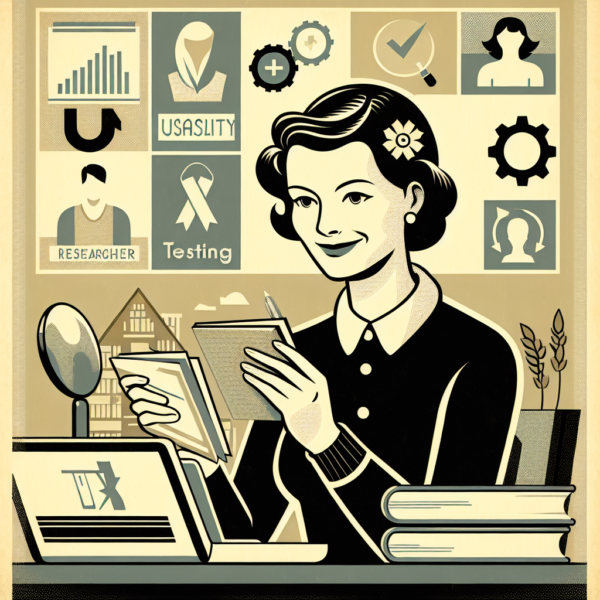Usability Testing In A UX Researcher Job

The Critical Importance of Usability Testing in UX
Usability testing is a fundamental skill for UX Researchers, pivotal in determining how end-users interact with products. It is not merely about finding what users like or dislike, but about validating the underlying design principles and ensuring that the product fulfills its intended purpose effectively. Mastery of usability testing is crucial as it directly influences user satisfaction, retention, and ultimately, the success of the product. In the competitive landscape of tech and beyond, companies rely heavily on UX researchers to bring forward data-driven insights that drive product enhancements and innovations.
Understanding the Context and Variations of Usability Testing
Usability testing transcends various levels of expertise and sectors, making it a versatile skill in the UX toolkit. For entry-level professionals, the focus might be on conducting and recording tests, while mid-level roles expand into designing comprehensive test plans and analyzing data to inform UX strategies. At a senior level, the role evolves into a strategic element, influencing product development and user strategy across the board. This progression shows that usability testing is not static but grows in complexity and impact with experience and seniority.
Looking to build a resume that will help you compete in today’s tough job market? Jobalope’s resume tool will analyze your resume and any job description and tell you exactly how to take it to the next level.
Real-World Applications and Success Stories of Usability Testing
Usability testing has proven its worth across various industries by enhancing user interaction and satisfaction. Companies like the Nielsen Norman Group demonstrate through numerous case studies how insights from usability testing can lead to significant improvements in product design and user experience. For instance, a well-executed usability test can lead to redesigns that drastically improve conversion rates. Success stories abound in the careers of UX researchers who have leveraged this skill to ascend to thought leadership positions within the industry, such as Don Norman, a co-founder of Nielsen Norman Group and an influential figure in design and usability.
Effectively Showcasing Your Usability Testing Skills
To effectively showcase your usability testing skills to potential employers, it is crucial to maintain a robust portfolio that details your testing processes, findings, and the impact of your work. Engaging in UX communities and forums, and sharing your insights through articles or presentations can also highlight your expertise and thought leadership. Participating in real-world projects or internships can provide practical experience and case studies that enrich your professional profile and demonstrate your capability to prospective employers.
Career Pathways Enhanced by Expertise in Usability Testing
Proficiency in usability testing paves the way for numerous career opportunities within the UX field. From UX Designers to Usability Analysts, the skill is foundational for a variety of roles that require a deep understanding of user interaction with products. Enhancing usability testing skills with related competencies such as Wireframing, Prototyping, and User Research can significantly enhance your desirability and effectiveness in these roles.
Valuable Insights from Industry Experts on Usability Testing
Experts in the field of UX emphasize the importance of empathy in usability testing, as understanding the users perspective is crucial for deriving meaningful insights. Staying updated with the latest trends, such as remote usability testing, is vital for keeping your skills relevant in a rapidly evolving field. Resources like Usability.gov and UX Mastery offer ongoing insights and community support to help professionals stay at the cutting edge of usability testing.
Keeping Up with Current Trends in Usability Testing
The landscape of usability testing is continually evolving with technological advancements and changing user expectations. Current trends include the increasing use of AI and machine learning to analyze test results more efficiently and the rise of remote testing methods which have become prevalent due to global shifts in work environments. These developments make it essential for UX professionals to stay informed through continuous learning and engagement with industry resources.
Tools and Methods for Measuring Proficiency in Usability Testing
Measuring proficiency in usability testing can be achieved through various tools and techniques. Platforms like UserTesting offer scenarios that simulate real-world usability challenges, allowing practitioners to refine their skills and receive feedback. Pursuing certifications, such as the Nielsen Norman Group UX Certification, provides a structured way to validate your skills and knowledge in the field, enhancing your professional credibility and career prospects.
Pursuing Certification and Gaining Endorsements in Usability Testing
Obtaining certifications in usability testing, such as those offered by the Nielsen Norman Group, can significantly bolster a UX professionals credentials. These certifications not only validate expertise but also serve as a benchmark for skills in the industry, making certified professionals more attractive to potential employers. Endorsements from recognized industry bodies or successful project outcomes can further enhance ones professional standing and career opportunities.
Strategies for Maintaining and Updating Your Usability Testing Skills
To stay relevant in the field of usability testing, continuous education and practice are essential. Attending workshops, webinars, and industry conferences are excellent ways to keep up with new methodologies and technologies. Joining professional organizations like UXPA can also provide valuable networking opportunities and access to the latest industry trends and best practices.
Category and Job
Skills
- Analytical skills in a UX Researcher Job
- Branding in a UX Researcher Job
- Customer experience in a UX Researcher Job
- Design in a UX Researcher Job
- Design thinking in a UX Researcher Job
- Interviews in a UX Researcher Job
- Project delivery in a UX Researcher Job
- Project management in a UX Researcher Job
- Prototyping in a UX Researcher Job
- Research methods in a UX Researcher Job
- Strategy in a UX Researcher Job
- Usability testing in a UX Researcher Job
- User research in a UX Researcher Job
- Wireframing in a UX Researcher Job